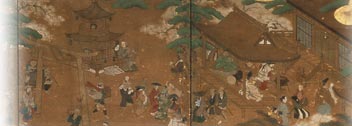Lecture Series and Seminar by Professor Pierre Frantz, Paris-Sorbonne University (Paris IV)
Outline
| date | June 28 - July 2, 2010 |
|---|---|
| Venue | Multipurpose Lecture Room, Basement, Building 26, Waseda Campus Maison Franco-Japonaise (co-sponsored by the Maison Franco-Japonaise) Classroom 302, Building 26, Waseda Campus |
| Organizer | Western Theatre Research Course |
| outline | Eighteenth-century France was known as the age of the Enlightenment. It was also a “century of theatre” in which a wide variety of spectacles saw the light of day. A theatrical revolution in the areas of theory and practice was being undertaken, a groping for an ideal form of theatre in every way. There have been few chances especially in Japan, however, to introduce these realities. This being the case, the Western Theatre Research Course (the Francophone theater studies project) took the opportunity to invite Professor Pierre Frantz of Université de Paris IV-Sorbonne to lecture on 18th-century French theatre. Professor Frantz is the foremost authority in 18th-century French theatre studies, primarily bourgeois theatre and the theatre of the revolutionary period. Not only has he developed stimulating arguments from his sweeping view of the field, he is also actively engaged in the dissemination of knowledge about 18th-century French theatre through, among other things, the recent publication of an anthology (co-edited by Sophie Marchand). |
Details
In his first lecture (with simultaneous translation) he gave an overview of 18th-century French theatre with an emphasis on the act of seeing. Having been liberated from the repression of an absolute monarchy, the 18th century was an age in which theatre flourished. But that was not all; it was an age in which revolutions in theatre architecture, lighting, etc., were also taking place, and the emphasis was shifting from speaking/listening to showing/seeing. Professor Frantz, showing images, gave an in-depth analysis and portrait of the variety of theatrical forms that developed out of these circumstances and that cannot be lumped together in a single genre, discussing their features and controversial points to shed light on 18th-century French theatre as a whole.In the second lecture, with simultaneous translation, which was jointly sponsored by the Maison Franco-Japonaise, he talked about theatre during the French Revolution. At a time when society itself was characterized as a grand “stage” and the idea of revolution had permeated the theatre, revolution and theatre became fused with one another, and a “mythologizing of theatre” occurred. On the other hand, theatre also became a tool in the service of ideology; the complex relations between theatre and revolution can be seen from the actual state of theatre itself and also from the repertoire favored during the Revolution. Situated between continuity and discontinuity, between myth and ideology, the defining feature about "Theater of the Revolution" is that it almost always escapes definition. Particularly stimulating was Professor Frantz’s observation that, as a result, theatre during the Revolution comes to interrogate the essence of theatre and indeed its very function.
The third session took the form of a seminar conducted solely in French; in it Professor Franz spoke about 18th-century French theatre from the perspective of Enlightenment thought. Diderot and Voltaire are known as Enlightenment thinkers, but they also left behind large contributions to the field of theatre. In particular, Diderot with his theory of theatre and Voltaire with his theatrical innovations in the area of practice had an impact on the theatre of later generations. It was a substantive seminar that explored the meaning of their “struggles” and the issues involved.
This project had invited an expert on 17th-century theatre to lecture during the previous academic year, and so the lecture series this time was also very interesting from a comparative perspective with 17th-century theatre.


